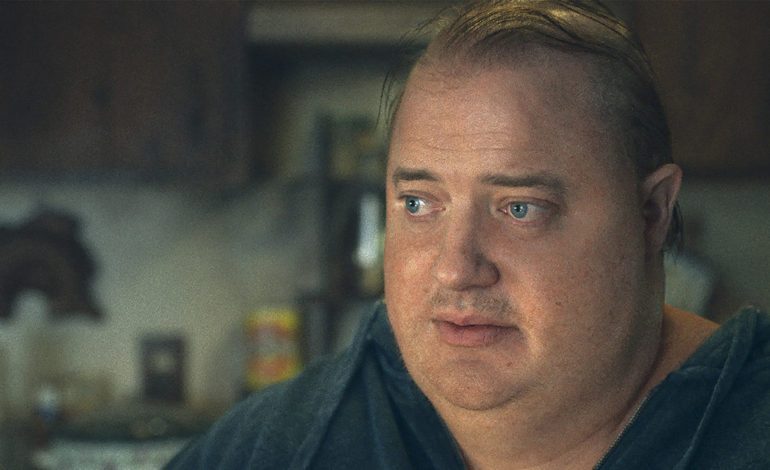

I wasn’t sure what to expect from The Whale when I initially heard about it. I was reasonably sure I would never see the film since I tend to shy away from heavy dramas. However, I was excited to witness Brendan Fraser‘s long overdue and highly publicized comeback after not seeing him act since The Mummy Returns.
Before seeing The Whale, though, I had never seen a Darren Aronofsky film, but I had heard about how his movies were psychologically dark and violent, and the trailers for Black Swan and mother! confirmed my surface-level suspicions. I found that The Whale had a lot to say about how we help others and ourselves, what it means to be spiritually saved from our vices, and the responsibility we place on ourselves to help others.
With that said, I was not ready for what I saw.
The film was honestly difficult for me to watch. As someone who has struggled with eating disorders my entire life, it was hard to watch Fraser’s character Charlie, a reclusive online English teacher, gorge himself on food to numb his pain. I have been prone to binge eating entire Little Caesars meals to soothe myself from past trauma or whatever I was dealing with.
Fraser did an excellent job displaying how mental illness can cloud our judgment and leave us unable to move forward. He can personify the immense struggle one can have to pull themselves out of emotional and physical solitude and the toll it can take on minds on bodies.
However, there was a disconnect between Charlie, the man versus Charlie, the English teacher. When Charlie teaches, his demeanor changes from sheepish into a confidant, charismatic teacher. I wish I had him as a teacher because you can tell how in love he expresses honesty through writing. He is in command of his class, his craft, and himself when he teaches.
Charlie’s demeanor changes dramatically when he is around those who know him and can see him for who he is. For example, when his best friend and healthcare provider Liz, played by Hong Chau, comes over to check on him, she scolds him and asks why he treats himself the way he does. Charlie quickly responds to each tirade with a whimpering, “I’m sorry,” eventually calming Liz into giving him some unhealthy food she had brought for him, enabling Charlie to continue living his unhealthy lifestyle.
The unbalanced characterization between a confidant, well-meaning teacher to a meek and submissive man is indicative of the fickle nature of the characters and acting throughout the film. While each character means well in their attempt to help Charlie overcome their struggles, their representation is uneven and, at points, immersion-breaking. Chau’s Liz, in particular, suffers from being one of the sole sources of exposition throughout the film and frustratingly on the nose with berating Charlie.
Stranger Things Sadie Sink, who plays Charlie’s estranged daughter Ellie, and Ty Simpkins‘ Thomas, a missionary who continuously tries to save Charlie’s soul, suffer from the same character direction as Liz. Both characters are shoehorned stiff and, at times, dramatic parodies of how people deal with those around them who are struggling with mental illness. Ellie, in particular, is at times comically mean to Charlie, to the point of being such a mean teen girl that you would think you were watching a Mean Girls sequel. Likewise, Thomas’ constant religious sales pitch is annoying after an hour and a half.
Aronofsky’s use of these frustratingly annoying characters illustrates the paradox of helping others: you can yell, criticize, pray, and attempt to force others to change their lives. Aronofsky deposits that in the end, though, each person has to decide to change their life. That is the point at which they will achieve apotheosis and start to move forward with their lives, releasing others from the yolk of saving others.
Score: 3.5 out of 5
Overall, the film was a wonderfully flawed mess. It painted a picture of a broken man surrounded by people trying to save him. However, in some cases, the characters suffer from odd directions to the point of parody. The depiction of Charlie’s eating disorder was also tricky for me to view personally, to where I had to look away from the screen to keep it together. I also found Aronofsky’s ‘pull yourself up by the bootstraps’ mentality towards mental health and “salvation” to be problematically simplistic.
Should you see this film? Yes, please watch it. It will annoy you, make you look away, and make you wish that this film was a play instead of a movie. But it is worth the trip. Fraser proves he is an outstanding actor deserving of more leading and dramatic roles. Witnessing a comeback in real-time is indeed something to behold.
